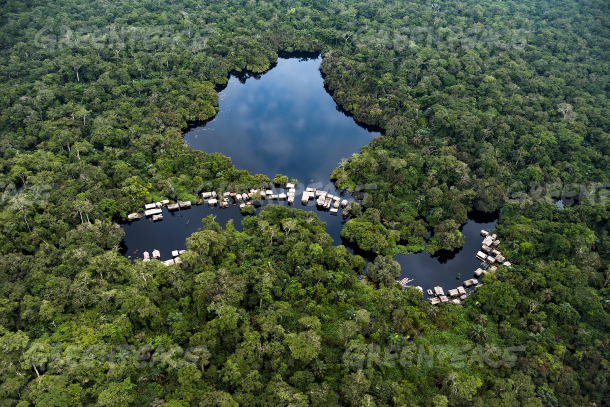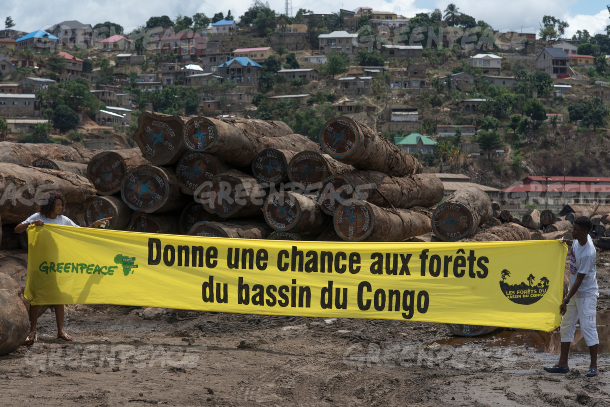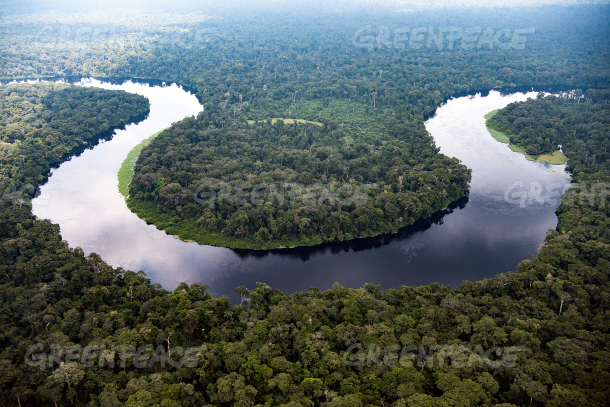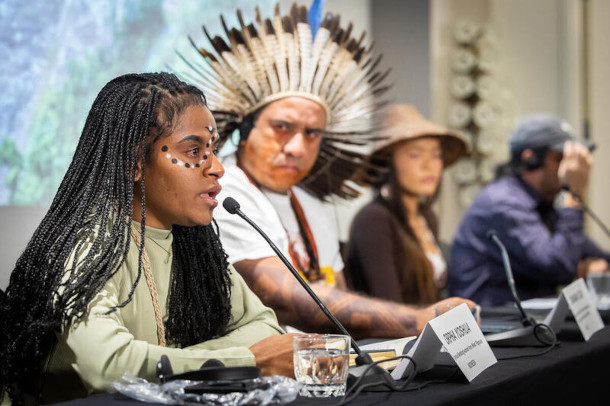Saving the Second Lung of the Planet
Air Date: Week of March 17, 2023

Aerial view of village in Lac Paku in the peatland forest near Mbandaka, Democratic Republic of the Congo. The Congo peatlands are the most carbon-rich tropical region in the world and are estimated to store the equivalent of three years’ worth of total global fossil fuel. (Photo: Courtesy of Greenpeace Africa)
The Congo Basin in Central Africa is a critical biodiversity hotspot and linchpin in the fight against climate disruption. Conservationist Irene Wabiwa joins Host Steve Curwood to discuss the urgent need to turn the United Nations’ recent promises to protect biodiversity into reality in the Congo and around the world.
Transcript
CURWOOD: The fifteenth conference of the parties of UN Biodiversity treaty in Montreal, Canada late last year led to an agreement to address biodiversity loss, restoration of ecosystems, and protection of indigenous rights. Nations pledged at COP15 to protect 30 percent of the planet by the year 2030 and mobilize at least $200 billion a year in funding. They also agreed to send $30 billion a year from developed nations to the developing ones that contain most of the world’s biodiversity. Concerned scientists hope it’s not too little too late. Already there has been a nearly 70 percent decline in the world's animal populations since 1970, according to a World Wildlife Fund study. Not only are the Amazon and Asian rainforests under threat, the Congo Basin in Central Africa is also a critical biodiversity hotspot and a linchpin in the fight against climate disruption. For more I’m joined by Irene Wabiwa. She is an international Project Leader for Greenpeace Africa based in the Democratic Republic of Congo and attended COP15 in Montreal. Welcome to Living on Earth!
WABIWA: Thank you.
CURWOOD: I want you to give us the big picture here. Why is biological diversity a global issue? In other words, why is there an international convention on it?

A yellow banner reading 'Donne une chance aux forêts du bassin du Congo', French for "Give Congo Basin forests a chance" is displayed on harbour logs at the terminal in Matadi, DRC. (Photo: Courtesy of Greenpeace Africa)
WABIWA: Yeah, that is a very huge question but very good one. You know, the global biodiversity loss is at the heart of the planetary emergency, the planetary crisis that we are all facing now. As the climate change, the biodiversity crisis is also becoming a real threat to the planet. So to protect the important ecosystem and habitat, to preserve the natural environment that is key to our own well being, the global community must take action now and collectively, and that's why the global biodiversity agreement is really, really necessary. The targets have been set in Montreal, we now need to quickly move from papers to implementation from speeches, from signature, to action on the ground, including the mobilization of finance. Without the appropriate finance the biodiversity crisis that we are facing, that is changing our life, day to day will be there and we will continue to struggle as we are struggling.
CURWOOD: How do the financing commitments made in Montreal at the biodiversity cop 15 compared to the need?
WABIWA: The finance issue was one of the most tricky issues at the Montreal conversation, we should say that there's clearly a huge biodiversity finance gap. Estimates are suggesting up to 700 billion US dollars annually that is needed to protect nature. But in Montreal, government has agreed to mobilize at least 200 billion US dollars per year, you can see that is not enough.
CURWOOD: Now, my understanding is that indigenous lands make up about 20% of the Earth's territory, and have about 80% of the world's remaining biological diversity. To what extent can lands occupied by indigenous people be conserved without bringing indigenous peoples into the discussion indeed, giving them credit for their stewardship over all these millennia?

Aerial view of Monboyo River and peatland forest of Salonga National Park south-east of Mbandaka, Democratic Republic of the Congo. (Photo: Courtesy of Greenpeace Africa)
WABIWA: We have so many examples, unfortunately. And in the Congo Basin region, which is the second largest rainforest of the world, is a region that is composed by six countries, we could see many countries like in Cameroon, in the Republic of Congo, where communities have been displaced from their land because the country has decided to create a national park. We have the example of Kahusi-Biega National Park where indigenous people have been asked to move away very far from their traditional lands because that land has become a national park. They were not consulted, they were not informed. They only saw conservationist coming to ask them to move because they need to protect that forest. And if this decision was taken to transform that land that piece of land into a national park it's because those indigenous people have been protecting this land for many decades, otherwise, they couldn't find anything. And instead of recognizing the efforts of those communities, and involve them in management, creation of National Park decision making, they just move them away. And that is not fair. No deal on biodiversity or nature protection can be successful if the rights of communities and induce people that are the best guardian of this ecosystem are not respected. We are happy that the deal in Montreal recognized the rights of communities, their free and prior informed consent to be respected. But we need to see those targets being implemented transformed into action, decision on national level.
CURWOOD: The Congo Basin, of course, is the world's second largest tropical rainforest after the Amazon, and some would say it is the most intact tropical rainforest. Describe it for us if you could, talk about the plants and animals and people who can be found in the Congo Basin.

At a press conference in Montreal’s COP15, global Indigenous leaders from Brazil, Canada, the Democratic Republic of Congo, Cameroon and Indonesia gathered to call for nature protection that centers Indigenous rights and shifts power from industry to Indigenous Peoples and local communities. (Photo: Toma Iczkovits, Greenpeace Africa)
WABIWA: The Congo Basin is really, its rich, it's beautiful. It's one of the most important wilderness area left on the on the earth, if not the intact area left on the earth, as you were saying. It represents 70% of the African continent plant cover, so it's huge, it's rich. About 26% of the planet rainforest is lying in the Congo Basin. It has a lot of rivers, a lot of savannas. We have the biggest tropical peatland in the Congo Basin. It's also a home to large mammals such as gorillas, elephants, buffalo, many other species that you can only find in that region. We're talking about over 11,000 species of tropical plant and more than 1,200 species of birds, 700 species of fish. So it's an area that needs to be protected, the second lung of the planet and if the coming Montreal deal need to be a reality, need to be successful, that means the Congo Basin as a region need to be protected at any costs.
CURWOOD: Now, as I understand it, the peatlands in the Congo and Central Africa there are the world's largest tropical peatlands complex. I think there's some 16 million hectares there, that will be bigger than England and Wales combined. And they've been managed sustainably by local communities for hundreds of years. Now, according to scientists, they hold some 30 billion metric tons of carbon, that's more emissions than the US emits every year. What are some of the dangers facing the peatlands?

Irene Wabiwa is the Forest Campaign Lead for the Congo Basin forest at Greenpeace Africa. (Photo: Courtesy of Greenpeace Africa)
WABIWA: Exactly. The Congo Basin is the largest complex of tropical peatlands in the world. And this very sensitive complex has been protected by communities again, and indigenous people since it's existence. And as you were saying, they store almost 30 billion tons of carbon, the equivalent of three years of global emissions from fossil fuel but unfortunately these peatlands are facing some serious threat. Taking the example of the DRC, where more than 19 billion tons of carbon are lying, the DRC Government has decided to auction 27 Old blocks, including in the forest protected area and the same peatland. And according to the scientists, if these oil concessions are not stopped more than one million hectare of those peatlands will be impacted by the oil activities. And talking about forest more than eleven million hectares of forest that is huge will be impacted. So if the oil blocks are not stopped in the DRC, which is more than 60% of the Congo Basin rainforest, this huge environmental disaster will impact our humanity, our planet, and our life will never be the same. That's why we're calling the DRC government to stop it's oil auction and preserve the future of the humanity.
CURWOOD: Irene Wabiwa is the international project leader for Greenpeace Africa. Thanks so much for taking the time with us today.
WABIWA: Thanks a lot Steve.
Links
Learn more about UN Biodiversity COP15
The Guardian | “COP 15 In Montreal: Did the Summit Deliver for the Natural World?”
Follow Irene Wabiwa on Twitter
Learn more about Greenpeace Africa
Bloomberg | “Congo Peatlands, Which Slow Climate Change, Bigger Than Thought”
Living on Earth wants to hear from you!
Living on Earth
62 Calef Highway, Suite 212
Lee, NH 03861
Telephone: 617-287-4121
E-mail: comments@loe.org
Newsletter [Click here]
Donate to Living on Earth!
Living on Earth is an independent media program and relies entirely on contributions from listeners and institutions supporting public service. Please donate now to preserve an independent environmental voice.
NewsletterLiving on Earth offers a weekly delivery of the show's rundown to your mailbox. Sign up for our newsletter today!
 Sailors For The Sea: Be the change you want to sea.
Sailors For The Sea: Be the change you want to sea.
 The Grantham Foundation for the Protection of the Environment: Committed to protecting and improving the health of the global environment.
The Grantham Foundation for the Protection of the Environment: Committed to protecting and improving the health of the global environment.
 Contribute to Living on Earth and receive, as our gift to you, an archival print of one of Mark Seth Lender's extraordinary wildlife photographs. Follow the link to see Mark's current collection of photographs.
Contribute to Living on Earth and receive, as our gift to you, an archival print of one of Mark Seth Lender's extraordinary wildlife photographs. Follow the link to see Mark's current collection of photographs.
 Buy a signed copy of Mark Seth Lender's book Smeagull the Seagull & support Living on Earth
Buy a signed copy of Mark Seth Lender's book Smeagull the Seagull & support Living on Earth

